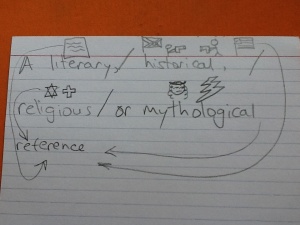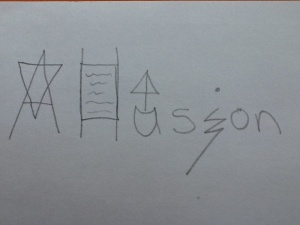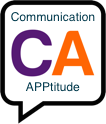Please view our PowerPoint presentation that we uploaded to SlideShare for you!
[slideshare id=17510389&w=427&h=356&sc=no] <div style="margin-bottom:5px"> <strong> <a href="http://www.slideshare.net/communicationapptitude/social-pragmatics-and-language" title="Social Pragmatics and Language" target="_blank">Social Pragmatics and Language</a> </strong> from <strong><a href="http://www.slideshare.net/communicationapptitude" target="_blank">communicationapptitude</a></strong> </div>
Thanks for reading.
Friday, March 22, 2013
Friday, March 15, 2013
Articulation Practice and Mad Libs
[caption id="attachment_226" align="alignleft" width="113"] Deena Seifert,
Deena Seifert,
M.S., CCC-SLP[/caption]
When we work with students on their speech sounds, we are counting on the student and his family to practice at home to carryover the techniques. Mad Libs has created an iOS app that can help students carryover practice. I give my students a list of their target sound in words categorized by noun, verb, adjective, adverb, etc. We open the app, choose a Mad Lib such as "Sleepover Party," "Camping Daze" or "Original Mad Libs" - there are so many to choose from - and then type in their words. When we are finished, we add their picture and email it to their mom or dad. Now they've got a story with their target sound to practice before our next session.

Parents can download the app and use it at home, as well, for even more carryover practice. What do you use for carryover practice at home? We'd like to hear what you are using with your students or children!
 Deena Seifert,
Deena Seifert,M.S., CCC-SLP[/caption]
When we work with students on their speech sounds, we are counting on the student and his family to practice at home to carryover the techniques. Mad Libs has created an iOS app that can help students carryover practice. I give my students a list of their target sound in words categorized by noun, verb, adjective, adverb, etc. We open the app, choose a Mad Lib such as "Sleepover Party," "Camping Daze" or "Original Mad Libs" - there are so many to choose from - and then type in their words. When we are finished, we add their picture and email it to their mom or dad. Now they've got a story with their target sound to practice before our next session.

Parents can download the app and use it at home, as well, for even more carryover practice. What do you use for carryover practice at home? We'd like to hear what you are using with your students or children!
Sunday, March 10, 2013
High School Vocabulary
Hi all. Deena and I have been busy lately, sorry we haven't posted much. Lots of excitement "behind the scenes."
I wanted to share some index card words that a smart young lady in high school worked on with me. This student had all but given up on memorizing vocabulary in science, social studies and literature because she could not handle all of the dense language that seemed meaningless. Here is how we broke down (discussing each phrase separately) the definition for "allegory - a narrative in which the characters, behavior and setting demonstrate multiple levels of meaning and significance." When she read the definition to me, all of the words were rushed together, she was not parsing them out for meaning. Because this is how she was attempting to memorize (short-term for meaningless information) it was unsuccessful.

In order to help her anchor the meaning to the actual vocabulary word (she had 20 multisyllabic words to remember), the student realized there were two Ls in the word, so we wrote Level 1 and Level 2. The gestalt of the definition is that what you see is not what you get, there is deeper meaning. She said, "Like layers of an onion" so we turned the "o" into an onion. "Story" rhymes with "gory" so we wrote that on the card as well. Here is the front of the index card:

Here is another card we did for Allusion


Notice that the actual letters of the word contain the very concepts that are embedded in the definition so the student had visual anchors to recall the word. The A became a Star of David (religious), the LL became a piece of literature, the U became a boat in Boston Harbor (historical) and the I became Zeus's lightening bolt (mythological).
After studying her vocabulary terms this way, she happily announced that she had gotten a good grade on her test!
I wanted to share some index card words that a smart young lady in high school worked on with me. This student had all but given up on memorizing vocabulary in science, social studies and literature because she could not handle all of the dense language that seemed meaningless. Here is how we broke down (discussing each phrase separately) the definition for "allegory - a narrative in which the characters, behavior and setting demonstrate multiple levels of meaning and significance." When she read the definition to me, all of the words were rushed together, she was not parsing them out for meaning. Because this is how she was attempting to memorize (short-term for meaningless information) it was unsuccessful.

In order to help her anchor the meaning to the actual vocabulary word (she had 20 multisyllabic words to remember), the student realized there were two Ls in the word, so we wrote Level 1 and Level 2. The gestalt of the definition is that what you see is not what you get, there is deeper meaning. She said, "Like layers of an onion" so we turned the "o" into an onion. "Story" rhymes with "gory" so we wrote that on the card as well. Here is the front of the index card:

Here is another card we did for Allusion


Notice that the actual letters of the word contain the very concepts that are embedded in the definition so the student had visual anchors to recall the word. The A became a Star of David (religious), the LL became a piece of literature, the U became a boat in Boston Harbor (historical) and the I became Zeus's lightening bolt (mythological).
After studying her vocabulary terms this way, she happily announced that she had gotten a good grade on her test!
Subscribe to:
Posts (Atom)
